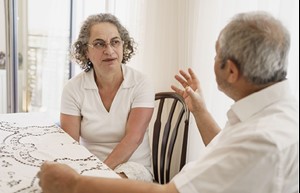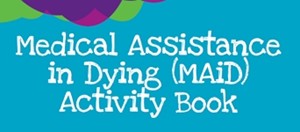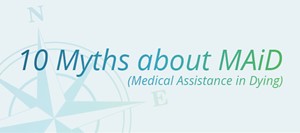Having the assessments
“I felt very anxious before that first meeting – I felt like I had to pass a test – but the doctor put me at ease right away…….it was more like a conversation than an exam.”
Your medical team or the MAiD office in your area will arrange the two required assessments. These are done by two different MAiD practitioners and are also called eligibility reviews. Most are done in person, but they can be done via telemedicine or video conference (like Zoom or FaceTime). Often a nurse and/or social worker will attend as part of the MAiD team.
If your death is in the foreseeable future, these assessments are arranged as soon as possible.
If your death is not in the foreseeable future, one of the two MAiD assessors must have expertise in your medical condition or a third practitioner with expertise in that medical condition must be consulted. The law states that the assessment process must take a minimum of 90 days, starting from the point one of the two assessors begins their review.
The MAiD practitioner will meet with you and anyone else you would like present. They will have a conversation with you and ask questions to ensure:
- You have all the information you need to make your decision
- You meet the eligibility criteria set out in the law.
- No one is putting pressure on you to make this choice. The decision must be completely your own.
- You are aware of all options, including palliative care.
- Unmet needs are identified and explored to see if there are any options to help with your suffering that are available and acceptable to you that have not been considered.
- You understand what will happen on the day of MAiD.
In addition to the above, if your death is not in the foreseeable future, you will be informed of ways to relieve your suffering, including counselling services, mental health and disability support services, community services, in addition to palliative care, and you must be offered consultations with those services.
Read more
It is recommended that those close to you attend at least one, if not both, of the assessments. If friends or family are unable to be there in person, arrangements can be made for a speaker phone or a video call. Family and friends will have the opportunity to:
- Hear your thoughts and feelings about why you want an assisted death.
- Hear how you are suffering or are anticipating suffering.
- Learn your wishes about the date, time, location, and who you may like present.
- Learn what the process is from “the experts” and ask questions
- Meet members of the MAiD team who may be present at an assisted death.
- Learn that only you can make the decision to have MAiD, and you can change your mind at any time.
- Feel better prepared if you decide to have the assisted death, and immediately afterward.
- Provide immediate support to you and each other.
While it can be emotionally hard to be part of these conversations, in general, it is easier to deal with what is known, rather than what is imagined.
You might not want your family present. That is always your choice and you do not have to have them there.
These assessments may uncover the underlying sadness you and those close to you are feeling about your health and your suffering. This can be hard, but it can also provide opportunities to have deep and meaningful conversations.
You might also be feeling:
- Anxious: Fear of the unknown is normal. As you wait for the meeting, you may find yourself feeling worried. You might be anxious that you will not be eligible and feel like you have to “pass a test”. This is not uncommon. The MAiD team will do their best to help you feel more at ease.
- Surreal - You might find it hard to talk about your death in such a matter-of-fact way. Many have expressed how “surreal” it feels to be talking about and planning one’s death.
- Relief - You might have feelings of relief, especially that the process is moving forward. Many people with serious medical conditions who are declining find themselves focused on ending their suffering and feel relieved that MAiD is an option for them. For others, they feel overwhelming sadness at the thought of leaving those close to them. For most, it’s a combination of both.
- Reassured - You may feel reassured knowing, if approved, that you do not need to choose a date right away, and that you never have to have MAiD. You can change your mind at any time.
- Frustration - Some people find the interviews frustrating because it seems so obvious to them why they are requesting MAiD. Some have found the second assessment tedious because it feels very repetitive. This can be especially true if you are feeling very fatigued and unwell.
It can be helpful to talk about your feelings and thoughts with your family members, close friends, counsellor, spiritual supports, or your health care provider.
If you are concerned about how medications may impact your ability to participate in the assessments, discuss this with your healthcare providers and the MAiD assessors.
If you were able to be at the assessments, you may have similar feelings such as – sad, anxious, surreal, and reassured. You may feel shocked by how much the person has been suffering, and how long they have been thinking about MAiD, or you may be very aware of their suffering, and you may have talked about it together many times.
You may have trouble absorbing all the information. You may be worried about how you are going to tell other members of the family or close friends, if that is something they want you to do.
If you can, it can be helpful to “check in” with each other about how you are all feeling and what questions you may have of each other.
Read more
The MAiD practitioner will let you know as soon as possible. If your death is reasonably foreseeable, you will know very soon after the assessment interviews are completed.
If your death is not in the foreseeable future, there is a minimum 90-day assessment period and thus it may take some time before you know if you have been approved.
For most people, finding out you are eligible comes as a tremendous relief. It often also comes with mixed feelings. You may be flooded with feelings of sadness about your life coming to an end. You may also be worried about how some of your family will be after you are gone. You might feel ready to say goodbye, but others around you may not be.
Some people have expressed that knowing that they are eligible for MAiD has helped them relax and live more fully in the present. It is important to remember that once approved, you are never under any obligation to have MAiD.
If one of the MAiD assessors decides that you do not meet the eligibility criteria, you can:
- Request further assessments.
- Continue with ongoing treatment to manage the illness, disease or disability.
- Continue with palliative care.
- Stop any or all treatment.
You may be feeling devastated, angry, frustrated, disappointed, relieved - a range of emotions. It can be helpful to talk with your health care provider and/or a counsellor about how you are feeling.
Videos
More Articles

What is MAiD?

The application process for MAiD

Why do people consider MAiD?

Telling family and friends

Talking to children and youth about MAiD

Starting a conversation about MAiD with the person who is ill

Seeking information and starting the process

Capacity and consent and why they are important

Choosing when and where

Planning for the time left

Planning the day of MAiD

A medically assisted death

Grief after a medically assisted death

For healthcare providers







